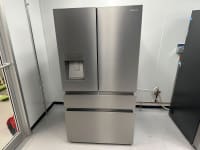How to tell when your food is freezer burned—and what to do about it
Don't throw it out!
![The Jolly Green Giant weeps. [Photo: Flickr user "Steven Depolo" (CC BY 2.0)]](https://reviewed-com-res.cloudinary.com/image/fetch/s--_0FHcBxC--/b_white,c_limit,cs_srgb,f_auto,fl_progressive.strip_profile,g_center,q_auto,w_972/https://reviewed-production.s3.amazonaws.com/1676995855002/freezer_burn_hero.jpeg) Credit:
Reviewed / Dave Ellerby
Credit:
Reviewed / Dave Ellerby
Products are chosen independently by our editors. Purchases made through our links may earn us a commission.
You spend your hard-earned money on a package of juicy steaks. You take half and toss them on the grill and throw the other half in the freezer. Three weeks later, you have a hankering for some red meat only to find gray spots covering your steaks. What gives? That, my friends, is a sign of freezer burn.
Luckily we can help you avoid freezer burn by storing food correctly. If the damage is already done, we also have tips for rescuing foods with freezer burn.
What is freezer burn?
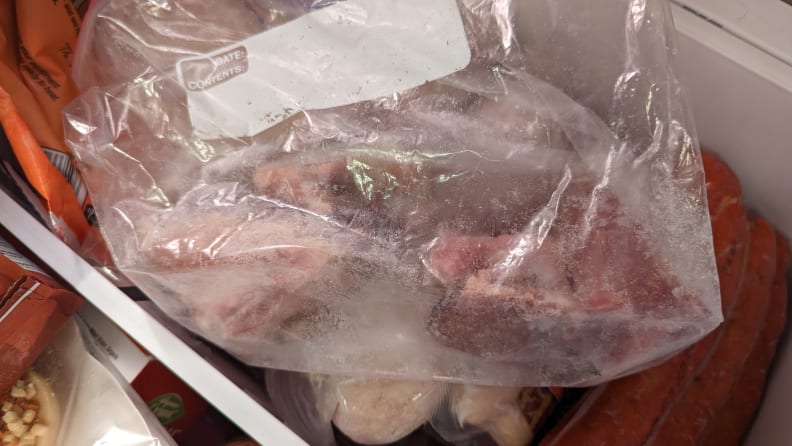
The ice inside loosely packaged meat is a sign of moisture loss and freezer burn.
Freezer burn happens when freezing foods are exposed to air.
Air exposure causes several problems. The most obvious is that it dries out your food. More subtle changes also happen when oxygen in the air also reacts with chemicals in the food, changing the color and flavor.
Most foods contain a lot of water. This forms ice in the freezer, but even though it’s solid, it can still escape from your food as water vapor through a process called sublimation. Sublimation can happen at any freezer temperature but is worse if your freezer gets too warm.
Freezer burn doesn’t make food unsafe to eat, but it really hurts flavors and textures.
What are the signs of freezer burn?
You can use all your senses to find out if a cut of meat has freezer burn.
See: If you look at a piece of meat and it has gray or brown spots on it, that is a tell-tale sign of freezer burn. Ice crystals on your ice cream or inside loose packaging are also a bad sign.
Hear: Give meat packaged in butcher paper a light squeeze. If you hear ice crystals cracking, moisture has come out of the meat and refrozen on the surface.
Touch: Freezer burned meat has a leather-like texture.
Smell: A quick whiff can also tell you if meat has developed freezer burn. A strong plastic-y smell is a good indicator of air exchange between your food and the freezer.
Is freezer-burnt food safe to eat?
Yes. You can eat freezer burned food—assuming it hasn't been in the freezer for longer than is recommended. However, moisture loss means the food will be tougher and lose flavor.
What can I do about freezer-burnt food?
If you find your meat has just a bit of freezer burn, it could be savable. Let it thaw a bit, so you can examine the full extent of the damage. Next, cut off the affected areas. With poultry, remove the skin as well. (It'll taste gross now, anyway—trust us.)
Brining can also help resuscitate meat, especially on the surface. We also suggest you use a lot of spice to mask the plastic flavor the meat will have acquired.
For heavily freezer-burnt meat, a stew might be your best bet. A low-and-slow approach will give the meat time to absorb moisture and flavor.
If all else fails, freezer-burnt meat makes a great treat for the family dog. And if your dog won't eat it, you probably shouldn't either.
Although it’s often more noticeable on frozen meat, ice cream can also suffer freezer burn. Rescue a freezer burned pint by cutting away the damaged surface layer.
How can I prevent freezer burn?
Have a cold freezer
The FDA recommends keeping your freezer at or below 0°F. Ensure you're hitting the right temperature by investing in a basic fridge/freezer thermometer.
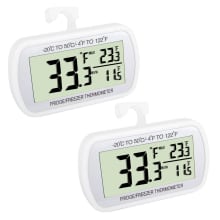
Make sure your fridge and freezer are the correct temperature with these thermometers.
Also, check your freezer door gasket. Badly sealed fridges and freezers don’t cool efficiently.
Use air-tight packaging
Water always seeks to go from wet areas to dry areas, like from your juicy steaks into the dry freezer air.
Freezer bags, which are extra-thick versions of the familiar zip-top bag, are designed to avoid rips and punctures, keeping out that damaging air. These Ziploc freezer bags are specially designed to reduce freezer burn.
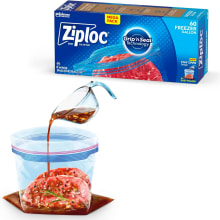
Keep your frozen foods fresh with these Ziploc bags.
If you freeze a lot of food, it could be worth investing in a vacuum sealer. Check out the vacuum sealers we’ve tested, and our number one choice, the FoodSaver FM2000.
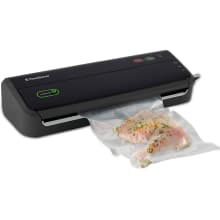
If you use a lot of freezer bags, it may make sense to invest in a vacuum sealer.
You can also squeeze extra air out of zip-top bags using this method:
You can exclude air from a partly finished pint of ice cream by covering the surface with waxed paper.
Invest in a chest freezer
If you make bulk frozen food purchases, consider investing in a chest freezer. These specialized chillers are better designed to maintain low temperatures, keeping your food fresh.
Actually eat the food you freeze
Cooking and eating the food you freeze in a timely manner is the best way to prevent freezer burn. A magnetic to-do board that you stick on your freezer door can be a great way to keep a list of what is in your freezer and when you need to eat it.
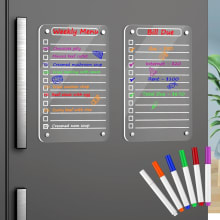
Keep track of your frozen foods with a magnetic list like this.



